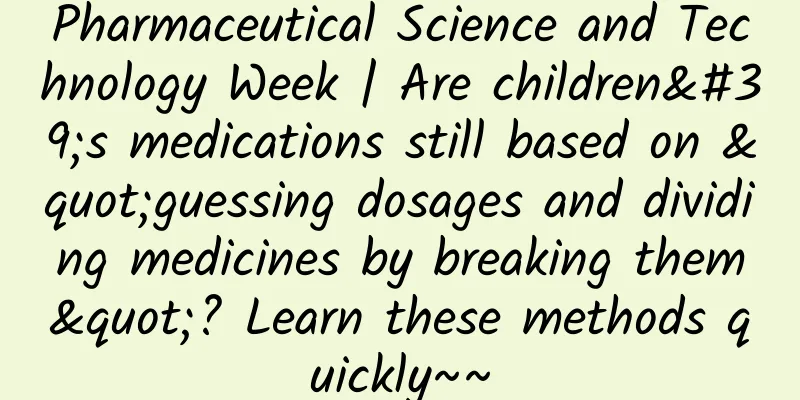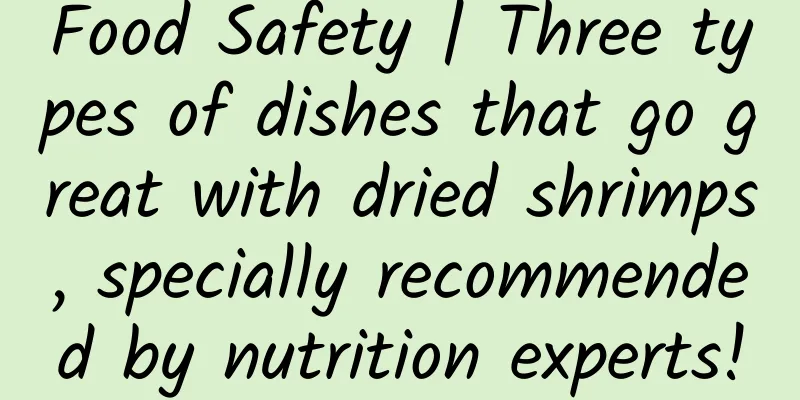Pharmaceutical Science and Technology Week | Are children's medications still based on "guessing dosages and dividing medicines by breaking them"? Learn these methods quickly~~

|
It is reported that a careless father in Yixing City, Jiangsu Province, made a mistake in the dosage of the antipyretic medicine and gave his one-year-old child ibuprofen suspension that was 9 times the normal dose without reading the instructions, resulting in the child being hospitalized for emergency treatment... There are countless such cases in life. Children's safe medication is a matter of concern to every family. If you simply rely on "guessing the dosage and breaking the medicine", it will lead to serious consequences. So, how to give children medicine correctly? What are the methods? Children are not smaller versions of adults The growth and development characteristics of children determine that the use of medication for children should be more cautious and scientific, and it is not the case that simply reducing the dosage of medication for adults will do the trick. Children have small stomach capacity, irregular gastrointestinal motility, less gastric acid, and fewer intestinal microorganisms than adults, which affects the transformation and absorption of drugs in the gastrointestinal tract. In addition, children have large body fluid and extracellular fluid volume, low body fat content, low plasma protein binding rate, incomplete development of the blood-brain barrier and strong permeability, which can easily affect the distribution of drugs in the body. In addition, children's liver and kidneys are not fully developed and their functions are immature. They have low ability to metabolize and excrete drugs, and their drug clearance is delayed, so the chance of adverse drug reactions is relatively higher. Therefore, it is best for children to use special children's dosage forms and take the medicine according to the usage and dosage in the drug instructions or as directed by the doctor or pharmacist. These medication methods are unreliable Take the medicine with milk or juice, or add sugar to the medicine, and mix it with food such as Wangzai steamed buns. The trace elements in milk will combine with certain components of the medicine to form insoluble large molecules, which will not be able to exert the drug's effect; the acidic substances in fruit juice may neutralize the alkaline drugs and make the drugs ineffective; adding sugar or mixing with food will affect the absorption of the drugs, and some chemical reactions will occur, producing certain harmful substances, which will interfere with the efficacy of the drugs. Remove the drug shell or coating. No. The purpose of designing drug dosage forms such as capsules or coated tablets is to prevent the drug from irritating the stomach and decomposing and destroying the drug by gastric juice. If the shell and coating are removed, the decomposition and release rate of the drug will be accelerated, which will not only fail to achieve the desired therapeutic effect, but also easily cause drug poisoning. Abuse of adult drugs, or reducing the dosage arbitrarily without medical advice. Many adult drugs are prohibited for children. For example, common tetracycline drugs are prohibited for children under 8 years old, because they will affect children's bone growth or deposit in tooth tissue to form "yellow plaques"; and fluoroquinolone antibiotics are not suitable for minors under 18 years old, because they will cause joint diseases and hinder cartilage development. Giving children medicine without a doctor's order or by halving the dosage is unscientific, inaccurate, and unhygienic. If the dosage is reduced arbitrarily, the effect will not be achieved, and if the dosage is too large, adverse reactions are likely to occur. Children's medication "three steps" 1. Determine the dosage before taking the medicine The dosage of the medicine must be taken according to the doctor's instructions or the drug instructions! If the instructions do not specify the dosage for children, the dosage can be calculated as follows: 2 Pay attention to interactions, contraindications and time when taking medication Carefully read the drug interaction section in the drug instructions to be aware of it. If both Chinese and Western medicines need to be taken, remember to take them at least half an hour apart, and do not take Western medicines with Chinese herbal decoctions. Understand the contraindications in the instructions and choose whether to take the medicine based on your child's medical history. In addition, pay attention to the time of taking the medicine, which is usually marked in the instructions, such as morning, before meals, after meals, between meals, on an empty stomach, and at night. 3. Observe the child’s reaction after taking the medicine After children take the medicine, pay attention to observe their condition to see if they have any allergic symptoms. If children have unexplained crying, rash, fever, vomiting, abnormal breathing and other symptoms after taking the medicine, it should be considered an allergic reaction caused by the drug, and the drug should be stopped immediately to seek medical attention. Tips for children taking medicine 1. Selection method. Children should choose children's dosage forms, and they can choose dosage forms with good taste, such as sweet syrup, fruit-flavored chewable tablets, lozenges, etc., which are easier for children to accept. When taking medicine, tablets should be taken with warm water as much as possible, and liquid preparations can be slowly delivered into the mouth with a medicine feeder or dropper. 2. Coaxing method. Pretend to take medicine, make various delicious expressions, and tell the child that taking medicine is good for recovery from the disease to attract the child's attention, make him curious, and imitate adults to take medicine. 3. Game method. Parents should be patient and prepare some toys to play games with their children to distract their attention and reduce the pressure of taking medicine through game interaction. 4. Reward method: Tell your child that he or she will get some kind of reward after taking the medicine, such as candy, snacks, toys, etc. Author: Zhang Juan, pharmacist at the Second People's Hospital of Guizhou Province Review expert: Yun Yuan, deputy director and pharmacist of the Second People's Hospital of Guizhou Province Ren Yanli, Chief Pharmacist of the Gynecology and Pediatrics Group of the Henan Pharmaceutical Association Hospital |
<<: These organs that you always dislike can save your life at critical moments!
>>: T cells found in cornea for the first time! Protect eyes from viral infection
Recommend
The Department of Nuclear Medicine of Jilin University Second Hospital carried out multi-probe PET/CT imaging related to Alzheimer's disease
The Department of Nuclear Medicine routinely cond...
What medicine should I take for hot and cold during menopause
Many women will experience menopausal syndrome af...
Can I eat Liangpi during the confinement period?
Pregnancy is the most painful thing in the world ...
What to do if your lower body is swollen, painful and itchy
When women experience swelling, pain and itching ...
How long after the X-ray can I get pregnant
During routine physical examinations, people usua...
Bad temper and irritability during pregnancy
Nowadays, people are under great pressure in thei...
Can pregnancy be detected in 24 hours?
Many people believe that after a man and a woman ...
Can I eat Guilinggao when I have my period?
Women can eat grass jelly during menstruation. Gr...
How to relieve severe constipation in pregnant women
Constipation is one of the most common troubles d...
What causes yellow leucorrhea in early pregnancy?
A woman's estrogen level will change after sh...
What are the early symptoms of adenomyosis?
Nowadays, many women choose surgical abortion whe...
Coagulation and fetal arrest
Pregnancy is a time of surprise and pain. There a...
On the operating table, she felt her legs were "sticking up"
30-year-old Xiao Li couldn't get pregnant, so...
Female breast structure
The breast structure of female friends is relativ...
Girls often sweat hands and feet
The symptom of sweating hands and feet is very co...









